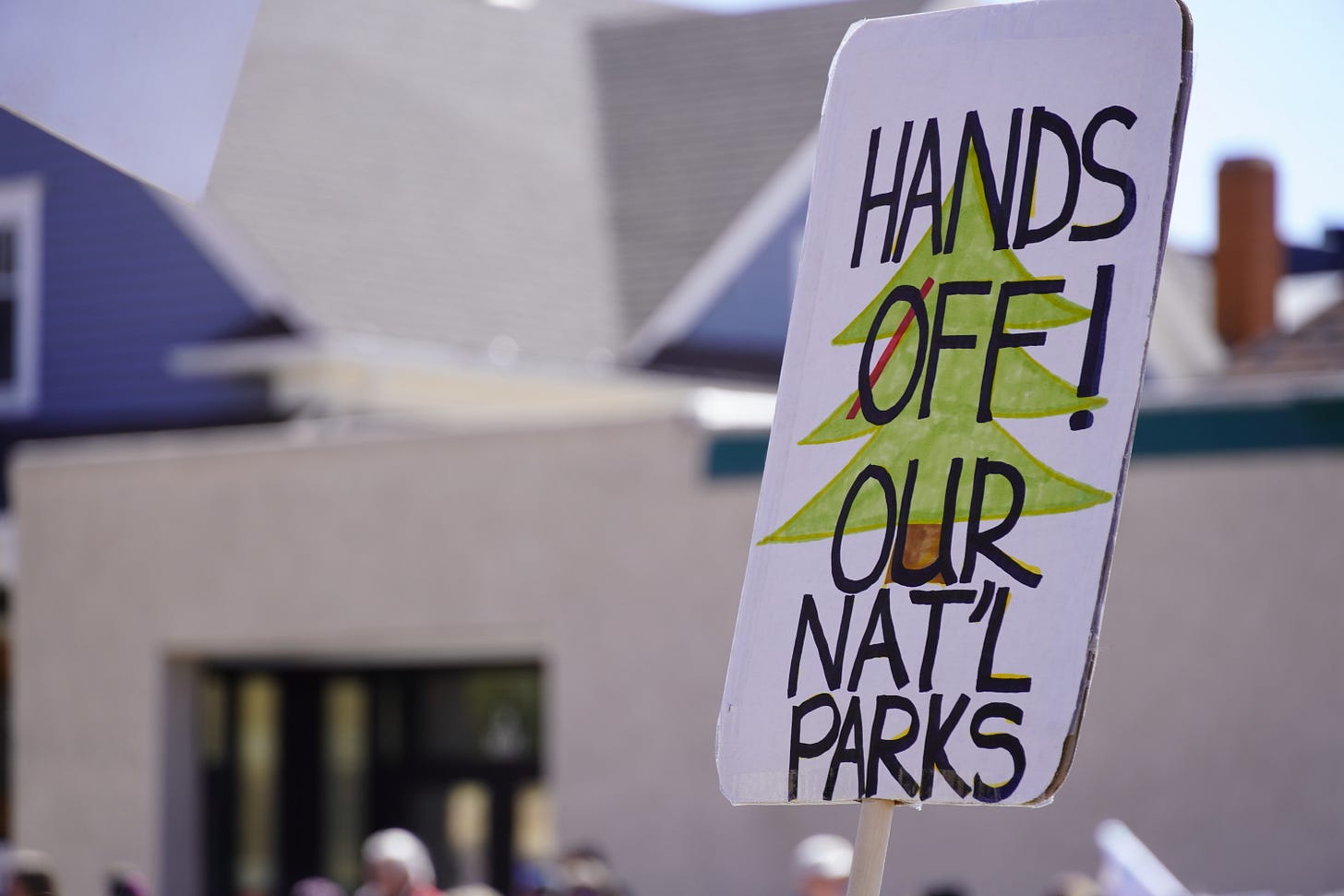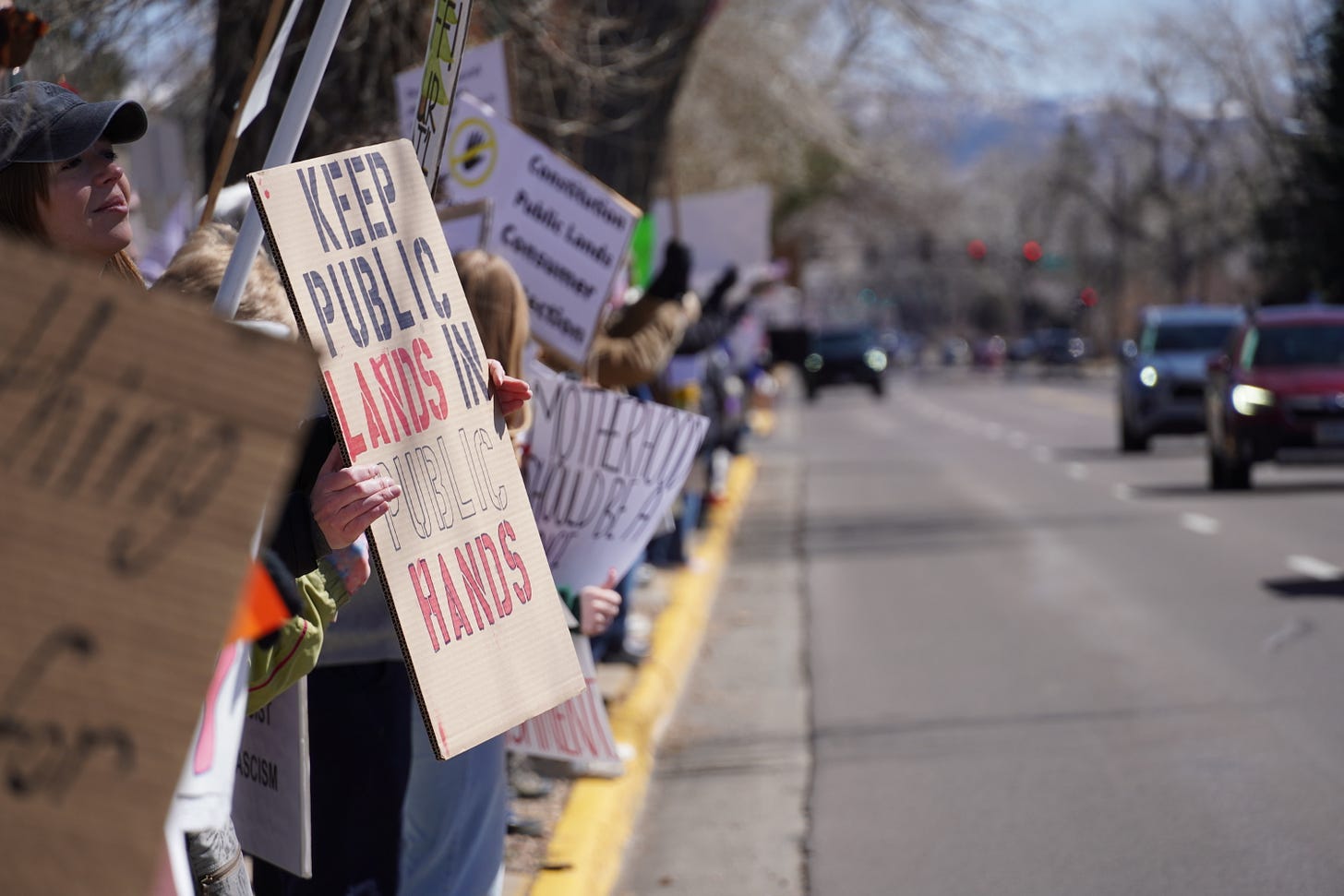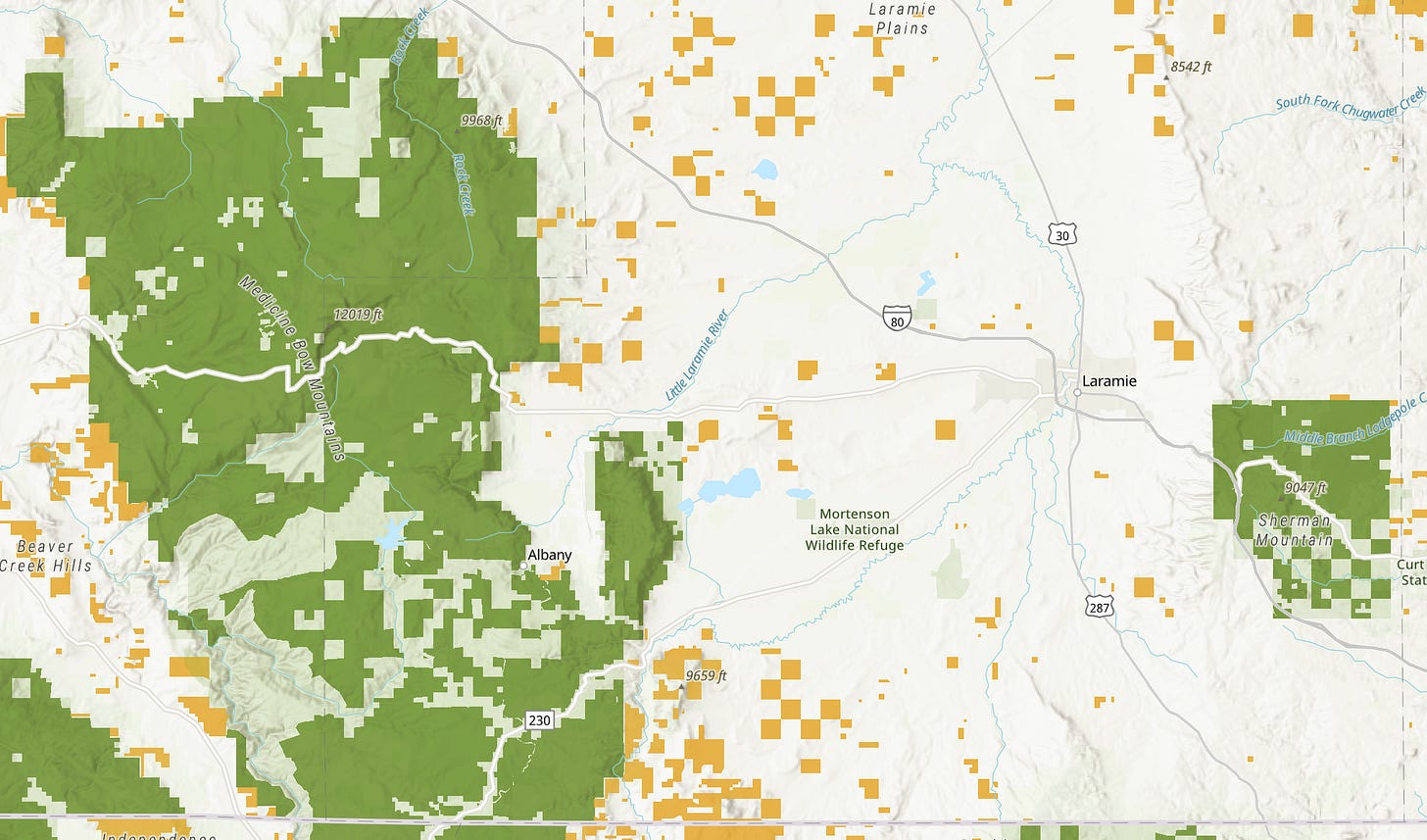Public land selloff proposal threatened Medicine Bow, continues to threaten other local parcels
Laramie Rep. Karlee Provenza and Wyoming columnist Rod Miller are among the cross-partisan coalition planning to rally in Cheyenne on Thursday.

Wyoming was rocked this month by a federal proposal from Utah Senator Mike Lee aiming to sell off millions of acres of public land.
A map produced by the Wilderness Society showed beloved parcels of land in Albany County could be among those on the auction block — from the Happy Jack and Pole Mountain area east of Laramie to the Snowies beyond Centennial.
Following public outcry and concerns about the proposal’s adherence to Congressional rules, Forest lands have been removed from consideration, leaving only Bureau of Land Management parcels on the table. Most of the land in Albany County threatened by the proposal was National Forest land.
The proposal takes the form of an amendment to the budget reconciliation bill — Trump’s so-called “One, Big, Beautiful Bill” — and it aims to offload 2-3 million acres of public land from the federal government to private entities.
But because it exempted only certain designated sites — like national parks and monuments — the end result was that any of more than 250 million acres throughout the west could have satisfied that 2-3 million acre mandatory selloff.
The Wilderness Society’s map showed these 250+ million acres.
That acreage included the Medicine Bow-Routt National Forest lands that feature so many of Albany County’s wild spaces both east and west of Laramie (in green) as well as Bureau of Land Management parcels dotted throughout the county (in gold).

Only BLM lands within five miles of population centers remain, following Lee’s reversal Monday.
Laramie Rep. Karlee Provenza (HD-45) said public landowners aren’t out of the woods yet, because Lee “has made it clear he plans to continue advocating for some version of selling off our public lands.”
Provenza pointed to the returning issue of lawmakers, Wyoming’s and otherwise, supporting the selloff of public lands.
“This is why, no matter what happens in Congress with the public lands sale, we have to continue to make sure they know that we will not stand for the sale of our public lands. Not now. Not ever,” Provenza said. “We have not won until every single elected official and aspiring politician knows our lands aren’t for sale.”
Lee’s proposal galvanized people across the political spectrum and across the west — from hunters to music producers to TV stars and everyday residents of the Mountain West.
“I am very passionate about my public lands,” Provenza said. “I have said multiple times, I’ll say it again: You will have to rip them from my cold, dead hands. This is an issue that I think everyone should be fighting tooth and nail for — to ensure that future generations have the same wide open spaces and the same wildlife and the same culture that we have now, particularly in Wyoming.”
As the issue gained media coverage and inspires outrage across the west, some Wyomingites, including Provenza, prepared to rally, planning action for Thursday at the State Capitol and the Federal Building in Cheyenne.
“I think that it is the most unifying thing in the country — specifically in the West maybe — that people don’t want their public land sold off,” Provenza said. “That plan has brought Republicans and Democrats and everyone in between, and people who are apolitical, to this circle to say: ‘Hell no, keep your hands off our public lands.’”
Rod Miller, a Wyoming columnist formerly with Cowboy State Daily but now writing for WyoFile, will be among the denizens descending on Cheyenne Thursday.
He said he’s been a public land-owner and -defender all his life.
“I grew up on a ranch in the checkerboard, and I did the federal lands planning in Governor [Mike] Sullivan’s office,” Miller said. “So I know this stuff backwards and forwards. Philosophically, public lands are such an integral part of how people in Wyoming think about themselves and their families and their home.”
He said selling off public lands is not a new idea, but it is a stupid one.
“That cuts against our land ethic in Wyoming,” Miller said. “For generations, Wyomingites have been able to go out and hunt and camp and fish on public lands without having to beg permission from anyone, and that's been passed down from grandfather to father to son.”
The protestors will gather at the Wyoming State Capitol at 6 p.m. on Thursday. From there, they will march with their demands to the Federal Building, where both U.S. Sen. John Barrasso and U.S. Sen. Cynthia Lummis have offices.
As of this story’s publication, the bill is in the U.S. Senate.
“Our targets are Senator Barrasso and Lummis,” Provenza said. “Because they directly have the power right now to remove the sale of public lands from the reconciliation bill.”
She added those who can’t attend in person can still raise their voice.
“The message for people that can’t be there: Call your senators right now,” Provenza said. “And get 10 people you know to call your senators.”
Congressional response
Before reversing some of the proposal Monday, Utah Sen. Mike Lee, had said the negative response to that proposal was being driven by leftist “falsehoods” and he called the Wilderness Society’s map “flat-out misleading,” telling a conservative podcast host that “eligibility for sale” does not mean “for sale.”
Lee, a long-time advocate of selling public lands, argued the selloff of 2-3 million acres mandated by his proposal will help to address America’s housing shortage by freeing up land for development.
Economists say that outcome is unlikely. The lands on offer — and specifically the forest lands removed Monday — do not typically abut cities and towns, where developers tend to put denser, more affordable housing that can take advantage of existing infrastructure.
Opponents of federal land selloffs worry that the housing most likely to be built on former forest grounds would be housing for the wealthy.
Barrasso, Lummis and Lee aren’t the only members of Congress taking heat.
Wyoming’s own Rep. Harriet Hageman, who has been receiving complaints since the Wilderness Society’s map went live, wrote a guest column in Cowboy State Daily. Like Lee, she called the map “misleading or flat out untrue.”
“Some environmental activists are trying to cast their opposition as standing up for Wyoming’s interest, but the opposite is true,” she writes. “They want to ensure the federal government retains ownership of every last acre of land, regardless of whether it serves any federal purpose or results in the ultimate demise of our local communities and families.”

However, Hageman makes clear that she views federally owned lands as a burden the people of Wyoming are forced to bear.
“The subject is understandably more intense in our part of the country, no doubt due to federal ownership of nearly half the land in the western U.S.,” Hageman writes. “Western states are at a distinct disadvantage as compared to eastern states when it comes to having this outsized federal footprint within our borders.”
Provenza, like many of her constituents, has been unimpressed by Hageman’s response. She published her own guest column in Cowboy State Daily outlining Hageman’s history of supporting federal land selloffs.
In an interview with the Laramie Reporter, Provenza pointed to Montana, whose Congressional delegation successfully got their state exempted from these selloffs. The Wilderness Society’s map showed Montana’s public lands, unique among the western states, were conspicuously excluded from consideration.
If states should be glad to offload some of these federal lands, Provenza asked, why would Montana be exempted?
“If that’s the case, why did Montana make sure that they were carved out of this?” she asked. “If it’s not that bad and it’s for housing — Montana has a housing crisis.”
Provenza said Hageman should stand with her constituents, who appear largely opposed to any mandated selloff.
“It’s honestly simple, and she’s trying to complicate the issue when all that she needs to do is say, ‘I hear you, Wyoming, I’m going to make sure that your public lands aren’t sold off,’” Provenza said. “But she’s not doing that because she doesn’t support that.”
The will to protest
The protest Thursday is likely to draw a crowd. It’s also likely to draw many who are not seasoned protestors.
Rod Miller is, rather loudly, no great fan of protests. He’s been critical of the No Kings protests Wyomingites have hosted in solidarity with national movements in recent months.

But Miller said this issue, an attack on public lands, is different. He said it’s both more “focused” and more “timely.”
“It just cuts a little too close to the heart of things,” Miller said. “For me as a Wyomingite, to have someone say, ‘We’re going to sell half your state to other people.’ Yeah, that to me is worth protesting.”
But the columnist stands by his earlier message to readers:
“What’s going to change things more than protesting is registering voters to vote against this kind of horseshit.”
For Provenza, there’s a bigger picture that ties this issue to the others people have been hitting the streets to protest.
“This is all happening at the same time that wealthy people are buying land in places like Wyoming so they can shield themselves from civil unrest and climate change problems and lack of water resources,” she said. “I can’t help but feel like the game is rigged … Now’s the time to fight. Not next week, not tomorrow.”
News of Sen. Mike Lee’s reversal on forest lands broke minutes before this story was set to publish. The text was updated in light of the new information, but we apologize for any tense changes we might have missed. This is a developing story. Stay subscribed for more coverage.







Excellent coverage, especially the hypocrisy of it all.
The attack on our public lands has been well thought out and any proposal to "sell" the lands should be refused; however, trading public lands like the BLM checkerboard that would be used to mitigate encroachment on wildlife corridors would be a beneficial transaction.
Montana got excluded because their Congressional delegation knew the voters would throw them out but the Wyoming delegation is supremely confident that they will face no backlash from the gullible WYGOP, so they go for the cash and not the will of the voters.
The other attack on our Lands is through management changes where the President is requiring Forest Supervisors to become Schedule F employees. Basically the Supervisor of the Med-Bow will have to swear a loyalty oath to the President to keep their jobs. If you control the laws to sell the land, one must insure that they get sold to the "right" people and a Forest Supervisor would have that clout. (https://federalworkerrights.com/2025/01/20/schedule-f-what-federal-employees-need-to-know/)
Rod is right that we need to register more voters but we also need old Pete Buttigieg to come to Wyoming instead of going to Iowa.